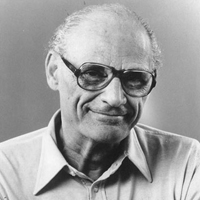Twentieth Century Tragedy Reflected in Death of a Salesman
The Aristotelian definition of tragedy has the tragic protagonist and that should be a noble figure whose fall would be moving enough and effect catharsis of pent-up emotional energies basically pertaining to pity and fear. Our times are without kings and the notion of tragic protagonist has accordingly undergone a great change.

Arthur Miller (1915-2005)
One of the requirements for traditional tragedy is that the hero should be of noble birth. In Death of a Salesman Miller countered that notion with a statement of modern purpose regarding the tragedy. The right to be the tragic hero shouldn't exclusively belong to people of noble birth. Even the common man can be the hero of a tragedy. It is a democratization of tragedy. Underlying the play is a belief that the common man is as apt a subject for tragedy in its highest sense as kings were. This clearly shows that the genre called tragedy has undergone a significant transformation in the twentieth century.
A look at traditional tragedies easily reveals the belief that only great personages of noble birth like kings were apt for tragic heroes. They could not even imagine that an ordinary man can even be the hero of a tragedy. This idea has been countered in the tragedies of the twentieth century. Arthur Miller's Death of a Salesman can serve as a representative example. A lowly salesman, Willy Loman is the hero of the play. He has been guided by the false myths of success. He believes that being well liked is the key to success in the world of business. Consequently, he worked for being well liked. For him minor crimes like stealing and adultery are not to be dismissed as such, but should be seen as the spirit of adventure. He is guided by the values of the past. The traditional values have crumbled down and there are no new values to live by. He tries to pass the same value on his sons. His anachronistic values cannot sustain him, but lead to disintegration. Nonetheless, his efforts should be seen as a man's fight for dignity in life. The conflict is between him and the surroundings in which he finds himself at present. The changed environment overwhelms him and he decides to end his life. This is a person's fight for status and rightful place in society. Every individual finds his reality reflected in Willy Loman. As we see him move towards disintegration we cannot help feeling deeply for him. We don't think about whether he is a king or an ordinary person, but we tend to see him as a human being and an individual like one of us. We pity him for his suffering and fall, and fear that what happened to him could possibly happen to us. He speaks for us. We are simply overwhelmed to find a man who decides to kill himself so that the rest of the family members could live a secure and a comfortable life. It moves us deeply. A man fighting for dignity and failing to attain it is sure to move us to sighs and tears. Our sensitivity cannot fail us. The play shows an underlying fear of being displaced by the disaster inherent in being torn away from our chosen image of what and who we are in the world. Among us today this fear is as strong as and perhaps stronger than it ever was. In fact, it is the common man who knows this fear most. This is Miller's view of tragedy and it is very powerfully dramatized in the play. Thus, using the common man as the hero of tragedy Miller challenged the traditional conception of tragic hero. If the Greeks were to watch the performance of this play they would not call it a tragedy. But it is a tragedy for us because it works and is true to life.
Death of a Salesman Study Center
Disturbed Gender Relation and Dysfunctional Family in Death of a Salesman
Subversive Nature of Language in Death of a Salesman
Death of a Salesman Study Center
Introduction of Death of a Salesman
Summary of Death of a Salesman
Dramatic Technique in Death of a Salesman
Style in Miller's Death of a Salesman
Themes of Miller's Death of a Salesman
 |
bachelorandmaster.com |